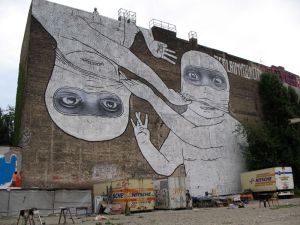Animation Street Art and Gif-itti
by Marie Zimmerman, Alexandra Holness, and Elyssa Jechow
When we think of street art, we think of artist working on a public canvas. In our era of digitization and modern technology, street art has reached remarkable diversity as new media have enabled the genre to travel to possibilities unforeseeable in earlier times. We are witnesses to a new generation of street art – animation street art and gif-ittis – born of our times. These forms document the production of street art, a tracking of the art’s visual evolution over a period of time. It focuses on the semantic change that lies within a work’s production, and the result is twofold: the lasting image on the public’s physical canvas is only the last in a series that emphasizes process as much as product, and a time-based piece of cinema shared over digital pathways and viewed on personal devices around the world.
A pioneer of this new technique is the Italian artist, Blu. His animation street art explores themes of transformation and metamorphosis, telling stories that bring the viewer along a journey through space and time. His work is not limited to the here and now, or to the traditional. The viewer of Blu’s film must deal with a paradox: the process of drawing, which realistically takes hours, is compressed into just a few seconds with the use of time lapse. The sense of time and space dissolves. The only hint of time is the movement of the sun, which becomes part of the plot. Days pass by in seconds. One wall can be used several times in a work, and traces of the previous use are still visible. What is left of the first image? How important is the last picture? Contemplated separately, each is worth nothing. Instead, the holistic view of the film creates meaning by emphasizing the process.
http://blublu.org/sito/video/muto.htm
The Japanese art collective, Rinpa Eshidan, follows a similar creative credo. The group of artists has produced eight videos which all play with the traditional perception of space and time. They describe their intention: “Instead of focusing on the finished project, we believe the process of creation itself is where art comes to life and our videos and live art aim to engage our audience in that process. Many people ask us how we can stand to erase the artwork we have worked so hard to create, but our focus is on the process of making art, not the end result.” (http://rinpaeshidan.jp/about/index.html, 10/31/11).
Working as a collective enables Rinpa Eshidan to create a variety of pictures in a relatively short time. While Blu has a very clear style with a high recognition value, Rinpa Eshidan mixes different elements and seems to reinvent its style in every film. The group addresses stereotypes of Asian culture and of the street art genre itself in order to dispel them in the artwork.
http://rinpaeshidan.jp/works/index.html
The new generation of street art is interactive. The viewer is challenged to follow the process. The picture itself assumes shape slowly and the end result is nebulous. Artists like Blu and Rinpa Eshidan play with the viewers’ expectations. Because of new techniques, the borders of the genre street art are permanently expanded. We come to a place where some might feel the need to separate street art and video art, but definitions can never distinguish the uniqueness of the artist’s approach.
The artist Pahnl worked with stencils and long exposure photography to create a four-minute video about a dog having a walk in a dark city. Two hundred stencils were used to let the dog come to life. Its perspective puts the city in another light and makes the viewer feel like a stranger in his or her own land.
Another new trend of animated street art is the use of animated GIFs. Among the pioneers of this technique, the artist INSA examines commodity fetishism, using the hyperbole of the absurd and of caricature to critique social ills. He calls his technique Gif-itti, and each piece requires painstaking preparation and labor. For one particular work, INSA painted the whole wall four times to get the right images for the gif. The result, as in Unit 44’s White Walls project, is an impressive and mesmerizing experience.
Another experimenter with GIFs and guerilla art, Princess Hijab produces work that is disturbing and at times shocking. Inventing the term hijabism, she puts black veils on highly visible posters on the subway in Paris, criticizing political grievances, consumer culture, and attitudes towards women. She has translated this public art into GIFs, producing a digital-age protest with compelling aesthetic interest blogged around the world (http://www.todayandtomorrow.net/2009/09/30/princess-hijab/).
There is much activity to be reported on the contemporary street art front – revolutionary new techniques and ideas — and we can expect that there is much more to come. Ongoing developments in digitalization create new avenues for expression, which artists are just beginning to explore. The genre of street art is in transition and we must wait and watch to see just what will happen next.
For related articles from The Muse Dialogue:
The Street Artist as Cultural Diplomat
Public Art, Public Statements: An Opinion on Graffiti
Barnett Newman and the Slashed Paintings




Love everything about this!
minor edit: Blu is from Bologna Italy!
Many thanks!